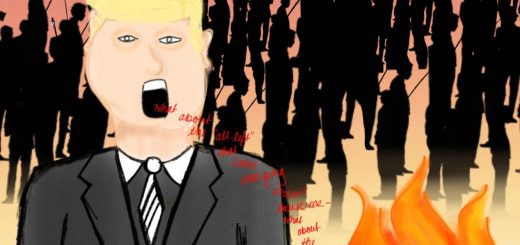A breakdown of impeachment
 Martin Falbisoner
Martin Falbisoner On January 13, 2021, the House of Representatives voted 232 to 197 to approve the impeachment article that accused former President Donald Trump of “incitement of insurrection” based on the events of the Capitol riot on January 6th. Trump previously went through one impeachment during his presidency that did not result in his removal from office, making Trump the first president in history to be impeached twice.
The term “impeachment” has been plastered all over the news and social media for weeks and yet I, like many others, have no idea what is happening and why. Although his presidency has come to an end, he still faces the Senate’s decision on his impeachment. To learn more about the impeachment process and the motivation behind the current impeachment trial, I talked with AP United States History teacher Amy Spizzirri.
*The purpose of this piece is to explain the impeachment charges in a way that is objective and informative. Please note that our source and interview is not endorsing either political party, but rather, seeking to better understand the democratic process.*
How does impeachment work? What is the process?
You can be impeached but not removed from office necessarily. Say there have been accusations or talk of wrongdoings by a president. Congress will start to investigate. Eventually, they have to look through the legalities of the investigation. “Did those things violate their office?” Once they investigate, the House of Representatives decides if to impeach the president. They have to get a simple majority in order for that to happen. Impeached does not mean removed, because then the Senate tries you. So when you’re looking at checks and balances and separation of power, the impeachment process is the congressional check on the executive branch. If they think the executive branch is abusing their office, they can create an investigation and they can impeach. The president is not removed unless they are convicted by the Senate.
Why would Congress try to impeach Trump so late in his presidency?
That would depend on who you talk to. The impeachment was spearheaded by the Democrats, in this instance, because Trump is a Republican. There are some questions about his taxes, and whether or not he incited riots. The reason for an impeachment so late is that they can take away certain things that Trump would be able to do, for example, running again in 2024. The idea of him running again and using his name as a base is a true possibility- he has a lot of followers. Some Republicans may want to take away his ability to run again so they can get his political base for future elections. Democrats might want to damage his political base and take away his stardom as a candidate. To impeach him this late does a few other things. I believe that it removes his pension, takes away his travel allowance, and it may take away his right to secret service.
Note: [The rules of impeachment are vague and sources differ. Some state that if convicted he could keep his pension since he would not have been removed from office or convicted in an impeachment trial while he was still serving. Other decisions such as his ability to run for a second term, his travel allowance, his security protection, and access to classified intelligence would need to be voted for separately by the Senate (after a conviction) and receive a simple majority vote.]
Are there different rules for former presidents when it comes to criminal charges?
No one is above the law. Once Trump is no longer president [his term is over] there are no protections. However, politics do play a role. He can be charged. He might have done some things that are a threat to national security in his dealings with Russia or another foreign power. I don’t know if they would move forward on those charges if there was a threat to national security. Legally he is not protected, but his position could allow him some protections.
More facts:
- All federal civil officers are subject to removal by impeachment except for Members of Congress.
- There are many debates about the process of impeachment and the rules after a president is convicted (it has never happened before).
- It is (somewhat) agreed upon that it is constitutional for an impeachment trial to continue after a president is out of office but there is no explicit rule.
- It is debated whether a president has the power to pardon themself.
For more information on the impeachment process and a breakdown of the constitution’s impeachment articles access this link. https://www.law.cornell.edu/wex/impeachment




Recent Comments